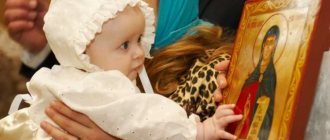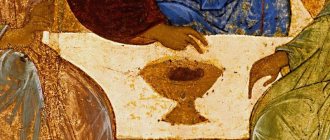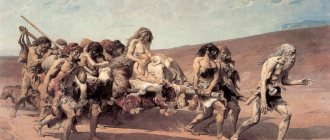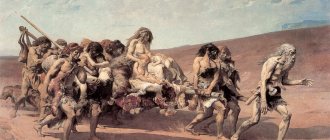Hello dear readers
Each of us, whether we are Christians or not, has an explanation for what the Fall of man is. Everyone is at different stages of dealing with sin.
For some, sins are a violation of religious rules, commandments and dogmas of the church. Some people consider an unrighteous lifestyle and evil deeds to be a sin. For many, this is a manifestation of hatred towards their neighbors.
And some even love sins because they bring pleasure. For which, by the way, you always have to pay: in this life or in eternity.
But we will look at sin, first of all in relation to God. But not only on the basis of the Bible and theology. And also from a spiritual and psychological point of view.
Concept of the Fall
According to etymology, the word sin comes from the Greek verb “amartano”, which means: to miss, to make a mistake. In the Russian language, the word “flaw” was previously used, meaning: an oversight, not a deliberate mistake.
In a religious meaning, applicable only to a Christian, sin is disobedience to God, a violation of moral laws.
The fall of Adam and Eve occurred through the influence of dark forces. The first fall from grace is associated with the world of angels, when Dennitsa, due to his pride, fell away from God. Later, out of envy of human nature, he seduced his ancestors.
God does not hide the existence of evil from people, does not protect (paradise is open to the serpent). The Lord only warns, showing, in relation to Adam, faith in his strength. This confirms the main role of man in the universe.
Lecture 2.2 The Fall
Audio |
What was Adam's sin?
Some believe that Adam ate the fruit and God became angry with him, got angry and kicked him out of Paradise. What is the sin that he ate the fruit? No! The sin is disobedience, and if we characterize the sin more deeply and accurately, then he sinned by believing the devil-serpent or the woman more than God. That is, for him someone is more important than God. In a world created by God, this is already a sin. We have come to the most important episode of Old Testament history - the story of the Fall. Let's start the conversation with Eve. There is a fairly common belief that Eve was “made” from a bone rib taken from Adam. This is wrong. By the word “rib” the Holy Scripture understands the edge of human existence. Adam seems to be split in half. One part of the nature of the one Adam remains in the man, the other in the woman. Only through this unity, through being in each other, is human integrity possible. Adam cannot live without Eve, just as Eve cannot live without Adam. They complement each other.
During a person’s stay in paradise, there was no talk of any headship of a husband over his wife (as we read about this in the Epistles of the Apostle Paul). Adam and Eve were absolutely one, equal and equal. Just as we cannot say that the nature of the Father is more important than the nature of the Son or the Holy Spirit, so the male nature is not more important than the female. After the Fall, we began to separate: this is a man, and this is a woman. Then, in paradise, they were united, they are one whole.
Now, with the help of the institution of marriage, everyone is making efforts in their own way to achieve in family life at least the slightest shadow of the unity that was in paradise. God established the Sacrament of Marriage to give two people the grace to be one. This unity can be achieved only if everyone - both men and women - agrees to bear some labor.
Many may ask: what about the monks? After all, they live alone, without women. Therefore, they will never achieve the fullness of human nature? No, that's not true. Indeed, in fact, the unity and fullness of human nature in Christ is Christ Himself. In it, everything - men and women, all peoples - are brought together so much that there is no difference, there is only the whole person, the way he was conceived and created by God in the primary act of human creation. A monk who loves Christ unites with Christ in his feat of love, serving his brothers, through communion, repentance, prayer or another way, but still achieves the same feeling of unity with the entire human race that a person living in marriage achieves. In the task set before a person to achieve love as a spiritual feeling of unity of oneself with every person living on earth, and with God, marriage and monasticism are completely equivalent paths. They have one task (or goal).
It so happened that it was Eve who became the indirect cause of the Fall. Her spiritual, sensual nature was more prone to temptation than Adam's spiritual nature. Through Eve, the serpent sneaks up on Adam in order to tempt him. In the fight against the spirits of evil in high places, Eve is slightly weaker than Adam. But it's not just about her. They are both one person, one whole. Now everything depends on Adam’s decision, who will he listen to more: Eve, who invited him to eat the fruit, or God, who said: “Do not eat!” The Bible does not talk about how Eve managed to persuade Adam, and we will not talk about it either. One thing is important for us - Adam sinned.
We know that the serpent is the devil. The question arises: why did God allow the devil to enter heaven to tempt Adam? Let's try to answer it. Let's imagine a married man. Can this man claim to be faithful to his wife if never in his life has he been placed in conditions where temptation could arise? If a man had not gone through this temptation, can he claim that he would have remained faithful to his wife? Obviously not, he just doesn't know it. Only the person who has experienced such a temptation can say: “Yes, I am faithful.” Loyalty is not some serene, infantile state. Loyalty is will, intensity of human character, courage. Loyalty is always an act. For us, the word “loyalty” is associated primarily with patience, overcoming difficulties, and some kind of feat. Where there is no feat, we cannot talk about fidelity.
God allows the devil to tempt Adam so that Adam, having survived the temptation, realizes his loyalty to God and makes the right human choice - with whom he is; realized in the image of Whom he was created and for what he should live; became truly faithful to God. Adam does not yet have sin in himself and can freely resist the devil in the person of the serpent. In the future, this will no longer be the case, but while he and the devil are on equal terms, Adam can reject what the devil offers him. But he does not do this, and a fall occurs, the destruction of the relationship with God and the relationship between man and man.
To better understand what happened, let's look at the story of Abraham. Abraham also went through temptation, and in two ways. For many years, for twenty-five years, he waited for the birth of a son and did not doubt that God could give him a son, although he no longer had the natural opportunity to give birth to a child. Then, when his beloved son was born, God sends Abraham to the mountain to sacrifice his son, and Abraham did not doubt, he believed God and went to do what God told him. Let us note that Abraham was in completely different conditions than Adam.
But the most important thing to understand is the story of the temptation of Christ Himself. The devil also came to Him, and Christ, according to His humanity, and to fallen, weak humanity, removed all temptations. Christ spent forty days in the desert and after that he became hungry. Just imagine the Man Christ in the desert, eating nothing for forty days! He is not just hungry, He is dying, all life in Him is fading away. We can say that He stands on the brink of life and death, or rather, He is almost dead. And then Satan appears to Him and says: “Your one word is enough - and You can turn these stones into bread.” But God did not give such obedience, and Christ says: “I would rather die than do what God did not tell Me to do, because the true source of My life is the Word of God.” You can easily talk and discuss everything while sitting at the table in a calm environment. But try saying that when you're dying. And Christ said this. He did, under much more unfavorable conditions, what Adam could not do under very good conditions. And with this He corrected the fall of Adam. Jesus Christ is the New Man, the Second Adam, and all those who believe in Christ and those who follow Him are united with Christ and follow Him into the world for which God created man.
So Adam sinned. What is his sin? Is it because he ate the fruit? Of course not. Sin, first of all, is disobedience. If we characterize sin more deeply and accurately, then Adam sinned by believing the devil-serpent or the woman more than God. That is, for him someone is more important than God. In a world created by God, this is already a sin. Only God must be an absolute value, standing above everything else. Only such a structure of the world is correct, because God is its Creator. God is my Creator. I was created in the image and likeness of God, which means that my happiness lies only in being with God. He is the source of not just my being; He is the source of my happiness! Therefore, any humiliation of God is a sin.
And so Adam believed everything visible - the fruit, the utterances of Satan, the tangible movements of Eve - more than the invisible presence and words of God. We do not know how God communicated with Adam in paradise, but according to the Holy Scriptures, only in Christ did the Word become flesh, God became Man and acquired a material body. Therefore, whatever this communication was, first of all, it was spiritual, invisible. Obvious, real, very tangible for Adam (he had something to mourn after the expulsion), but invisible.
Having committed this act, believing the material, mental more than the spiritual, Adam thereby subordinated both his own nature and the nature of all those who were born after him to the material principles of the world. We have become dependent on the world. Our life was inextricably linked with the world before, but through the Fall it began to depend on it. We began to sense and feel this dependence. Visible matter is our master to a much greater extent than God. As soon as we experience hunger, cannot sleep or are unable to fulfill some of our usual spiritual and physical joys, our whole being begins to be irritated, seething, and in such a state it is very difficult to fulfill the simple commandments of God. The body rebels, and we really want to listen to it. It calls to us, becomes our real tyrant, and only with willpower and grace-filled help can we not only overcome, but at least not stumble and slip into this service of the flesh. Although it can be very difficult to do this.
And Adam was the first to be tempted. He believed more in the material and visible and thereby betrayed his own spiritual nature. We are created not in the image and likeness of an animal, but in the image and likeness of God. We are spiritual by nature, and everything about us must be controlled by the Holy Spirit and dedicated to God. We ourselves have dedicated our lives to the substance, and this is a sin. We have lost our own dignity. In addition, Adam wanted to receive deification himself, that is, to become a god without God. Satan offers him: “If you taste it, you will be like gods.” Adam wanted to become like his Almighty Creator; wanted the honor and dignity of God. But he wanted to receive all this not from the hands of the Creator Himself (as a gift), but in some roundabout way, by stealing it, and receiving it by his own cunning. The Apostle Paul in the Epistles to the Philippians says that “Christ did not strive to be equal with God by robbery,” that is, he did not want to achieve equality with God by cunning, not by theft, but, on the contrary, he humbled himself to the image of a slave, to death on the cross. And God magnified Him.
Adam wanted to go a different way. He generally wanted an independent, autonomous existence without God. Actually, this is the original sin of Satan - the desire to be on one’s own. Let's not forget that Satan was created first of the angels, his name is Dennitsa (the earliest morning star). He was great, the most beautiful of all God's creations, the best of all the cherubim and angelic powers, the most powerful, the wisest. It was very unpleasant for him to realize and put up with the idea that the source of all his beauty, power and wisdom was Someone Else - God, above Whom he could never be. This caused him great envy, anger and pride. In the end, he would rather remain Satan, a fallen angel, but only on his own, as he wanted, and not as God wanted.
This can often be seen in people, especially clearly in children. “Let it be bad for everyone, let it be bad for me, but I will do as I want, and not as you ask me, not as you demand from me.” Actually, the act of suicide is a rebellion against the Creator. Yes, of course, God can have mercy on him, but he does not need God’s mercy. He wants only the way he wants, and since this cannot be, then let it be worse for everyone. This is the same rebellion as Satan’s. The only difference is that Satan could not kill himself materially. He committed spiritual suicide, cut himself off from the Source of life, and broke off his relationship with God. Now Satan expects the same thing from Adam, forces him to renounce God, as if saying: “Why do you need such a God? Why do you need to constantly be in debt to someone, constantly depend on someone? Live on your own." This is pride!
This thirst for autonomous existence is the scourge of all humanity; we are all sick of it. The less humble and meek we are, the more sick we are. We want to build a life on our own, we do not want to receive mercy, or as they sometimes say, handouts from God, we absolutely need to deserve something, so that it is not given to us for nothing, but deservedly. This is the leaven of the Pharisees. Many people are burdened by it and sometimes they themselves refuse the gifts of God precisely because it seems to them that they can accept these gifts only when they deserve them. Because then they can boast: that’s what I am! And accepting for free, out of mercy, seems humiliating to them. This is autonomous existence, a sin before God’s mercy, His truth. Whether we like it or not, He is the Creator. We are completely dependent on Him: like a fish depends on water, like a leaf on a tree. God created us, and this cannot be undone, we can only come to terms with it. Accept it as a great joy - I was brought into existence, I live thanks to the amazing God!
Now about one more (lesser than the main) sin of Adam - subordinating his life to his womb. Eve put her bodily sensations at the forefront, and Adam, having done the same, forever subordinated human life to the womb. It is for this reason that Christian life is inseparable from fasting, from abstinence in food. We are all slaves of the womb. Some understand this and declare war on this state of affairs, others understand but do not want to change anything, and still others do not understand. But no matter what anyone says, Christian life is genuine life in this world, one of the leading ascetic motives of which is not to obey all the dictates of the womb, to declare a constant intense war on it.
And yet God was not angry. Everything is much deeper - God took pity on Adam. He took pity and sent him out of heaven. Why? For what reason? And the reason is simple - so that Adam, in the state in which he was, would not eat from the Tree of Life and could not live forever, because he would become Satan, a demon. His state of isolation from God, rebellion against Him, would have been fixed forever - and he would no longer be able to repent.
All human life is the path to God. We make mistakes, we fall, we are mistaken, we sin, we get up again, so that at least in the last moment of our lives we can say: “I lived a bestial, unworthy life, but I understand that the source of my life is God, and I don’t want to live without Him! » After all, this is precisely what saved the robber. He brought nothing except this thought, evidenced in the word: “We accept what is worthy according to our deeds.” The thief would have confessed God as the source and purpose of his life if he had had the chance to start it over again. For this one confession he was pardoned. These words are salvation: turn your face to God; no matter what nakedness and ugliness we find ourselves in - to confess that He is God, and we are His creations and that He will never reject us. But Adam didn't do that. God tries to call to him and asks: “What have you done?” Adam says: “The wife you gave me forced me, seduced me, and I ate.” That is, in the end he blames God for everything - “It’s your fault that you gave me a bad wife.”
What are the consequences of the Fall? Adam was punished with hard labor. Now whatever he does, he must undergo difficulties. This is not a punishment, this is a blessing, because through this difficulty of existence Adam cannot “stick” to the world, cannot cling to it with his spirit and say: “This is my real royal palace, I will live in it forever.” Only the difficulty of our existence prevents us from loving this world to the end. If this were not so, very few people would turn to God. Difficulties are a help in our finding of God. The wife was punished by her attraction to her husband by the fact that from now on until the end of time her husband would dominate her. Please note, this is not Eve’s natural state, this is a punishment: since nature is sensual and subject to temptation, she must be brought under the control of the spirit and mind of a man. But this will not always be the case, this is just a state while history continues. In addition, the wife must give birth to children in agony. After the Fall, the earth was cursed. Adam is the king of this earth, but he turned out to be unworthy of his royal destiny; he is expelled; he is an outcast; he is deprived of the grace of God. As deprived of the grace of God, he cannot now intelligently govern this earth. And the earth naturally loses its grace. It becomes difficult to live in, various weeds begin to grow on it, thorns, thistles, insects and parasites appear. Adam understands that this is not paradise, this is a place of exile; this is a place cursed by God so that we do not forget that on this earth we are just strangers. This is our desert, a place of exile. Man now submits to instincts with which he has to fight, which, like animals, attack him, but he himself is to blame for this. This is not so much a punishment from God as it is simply a natural consequence of what Adam did. He submitted to his instincts and became obedient to them. Shame, fear of another person, fear of God appeared; not reverence, but precisely fear that God will punish. The son loves his father, and while this love persists, he joyfully runs towards his father; as soon as he sinned, fear appears, he hides, is afraid of meeting his beloved father, because not just punishment awaits him, but evidence that his son has become unworthy. And one last thing. When Adam leaves paradise, God leaves hope to help him, the hope that this will not always be the case. One day Adam will return to heaven, we just have to wait. Wait for the One who can bring both Adam and all humanity born after him into heaven to come. God leaves faith to man. Now, from the expulsion of Adam until the end of time, man, as the Scripture says, will live by faith.
Transcriber: Natalya Koval
The story of the fall of Adam and Eve
The spiritual state of man before the Fall was harmonious, calm and blissful. The crafty serpent tempted Eve to eat the forbidden fruit from the Tree of Knowledge. The wife not only ate it herself, but also gave it to her husband. Adam and Eve woke up in the morning and saw their own nakedness. They sewed aprons for themselves from fig leaves. Burning with shame and conscience, they hid behind the trees.
The Lord, walking through the garden, does not find his children and calls them. But they are hidden from his sight. From man's answers, God learns about the fall of Adam and Eve.
Calling for reason and repentance, the All-Merciful Creator three times about what they have done. But Eve blames the serpent, Adam blames his wife, and no one can admit sin and bear the fruit of repentance.
Some theologians believe that the Lord allowed the evil one into the Garden of Eden so that, seeing beauty and harmony, he would repent of his crime. Instead, the serpent was inflamed with envy of man, his conciliarity, similarity and completeness of relationship with the Creator.
God would forgive the culprits if they admitted their wrongdoing. The sad consequences of the Fall would never have happened, but this did not happen.
Everyone is sentenced by God to a just punishment:
- Serpent
He is cursed before the beasts of the field and the cattle. The Lord commands him to walk on his belly, that is, to crawl, and to eat dust all his days.
- Wife
Eve is determined to completely submit to her husband and give birth to children in illness and pain.
- Earth
After the Fall of man, everything created by the Lord underwent corruption. The animal and plant world ceased to see man as their caring shepherd, and the struggle for existence began. What is meant here is not the earth itself, but the fruits of human activity on it.
- Husband
The husband, according to Scripture, was created by God from earth (red clay), as the crown of creation. Now he is dressed in heavy flesh - leather clothes and is doomed to hard work all the days of his life.
The expulsion of Adam and Eve from Eden to earth, in accordance with the Christian understanding, is the beginning of the path to the salvation of mankind. This will only be accomplished through the crucifixion of the Lord Jesus Christ.
Fall of Adam
God's judgment on Adam is more severe than on his wife. Together with the first man, the whole earth is cursed. The Progenitor turned to the Tree of Knowledge too early. As a baby, he could not accept its fruits. According to Theophilus of Antioch, only over time does a child begin to eat solid food, and first feeds on milk. Thus, Eve’s transgression broke Adam’s unity with God. Having listened to the voice of his wife, the husband violated the Commandment of God, which protected him.
The Fall of Eve
The plot of original sin is widely represented in fiction. A fragment of the Sistine Chapel painting is notable for the artist’s own vision of the temptation of his wife by the serpent. Michelangelo about Buonarroti saw in Eve not a naive, curious creature, but a person aware of her action. A confident look of a strong woman, her hand takes the forbidden fruit. Eve discovered that the tree was desirable because it gave new knowledge. Having tasted the fruit, she falls into a new temptation - attraction to her husband.
In the fresco, the first parents stretch out their hands together to the tree of knowledge, contrary to the plot of the book of Genesis. A tree with a female serpent entwined around it divides the fresco into two biblical episodes. The artist depicted the ideal beauty of the first people in paradise and the terrible tragedy of the expulsion of Adam and Eve to earth.
The fall occurs in the heart
But let's see how sin enters a person's life. Firstly, the Fall occurred in the heart of man, and only then it was revealed and made manifest in the eating of the forbidden fruit.
Using the example of the overthrow of the devil, you can see what happened in the heart of Adam.
And he said in his heart: “I will ascend into heaven, I will exalt my throne above the stars of God, and I will sit on the mountain in the assembly of gods, on the edge of the north;
I will ascend above the heights of the clouds; I will be like the Most High.”
Isaiah 14:13-14
Satan at the beginning of the world was an anointed cherub and walked before the face of God. He was perfect in his ways from the day of his creation. But iniquity appeared in his heart, and therefore he was cast out of heaven. The devil's heart became proud of his beauty. And vanity destroyed his wisdom, so he was thrown to the ground.
But the fallen devil not only carried away a third of the angels created by God. But also our first parents, through whom we all became sinners.
First , Adam was the son of God who was visited and personally spoken to by God in the Garden of Eden in the cool of the day.
Secondly , he is the crown of creation, in which there was no defect or deficiency: neither in body, nor in soul, nor in spirit.
Third, he was a beloved child to whom God extended His grace.
When Adam ceased to be content with this glory and wanted to be God himself, he became the enemy of God.
Examples of the Fall in history
- Sodom and Gomorrah
There are several versions of why the Lord destroyed these cities: sodomy, greed, inhospitality. However, the main version is still homosexuality.
- Lot and daughters
The story of Lot and the fall of his daughters is described in Genesis. The daughters believed that after the terrible disaster sent by the Lord to their city, there were no men left. Both, having drunk their father, got together with him and gave birth to sons. They became the ancestors of the Moabites and Ammonites, from whom the Arab peoples descended.
- Fall of David
David ignored God's command not to take another man's wife. The presence of a large harem did not save the king from sin. Bathsheba became pregnant. David tried to make amends for his wrongdoing, but it led to a tragic end: the murder of Uriah (Bathsheba's husband). God sends the prophet Nathan to expose the king's crimes. David admits his sins only after a year. This story ended with repentance and reform, which does not happen often in the Old Testament.
Philosophy
The German Christian mystic Jacob Boehme, the founder of Western sophiology, writes that gender itself is already a consequence of the Fall, for a wife was created for man after his internal separation from the Jungfrau Sophia (German: Virgin Sophia); in the primordial state, man was supersexual. This Jungfrau Sophia is the abstract principle of wisdom, Spiegel der Weisheit (German: Mirror of Wisdom), and its relation to gender is established only by its name, apparently inspired by the “Book of the Wisdom of Solomon.” With this understanding of gender, the most central manifestation of sin is the evil conception from which a person is born. Jacob Boehme considers the creation of a woman from Adam’s rib as a consequence of the already accomplished Fall and the fragmentation of human nature.
Christian philosopher Nikolai Berdyaev writes that the legend of the Fall speaks of the origin of consciousness from a state of unconsciousness.
Religious philosopher Boris Vysheslavtsev writes: “To understand the meaning of the Fall and salvation, to understand the meaning of Christianity (and, in essence, of any religion) means to understand the meaning of ultimate freedom. She lifts us to the heights of absolute godlikeness in this simple and daily opportunity: to say “yes” or “no”; “let there be” or “let there not be” - in this amazing freedom of choice between creativity and destruction. For if all creativity is observance of hierarchy, then any violation and distortion of hierarchy is the opposite of creativity, that is, destruction.
The private fall of each person
In the matter of a person's personal responsibility, one should avoid understanding of his separate existence. All people are mutually influenced and responsible to each other.
Today the world does not want to recognize even mortal sins as evil. A person’s actions are justified in society under plausible pretexts. Propaganda for an easy, immoral life corrupts young people.
It is no coincidence that the new generation (all born after 2010) is named by sociologists with the first letter of the alphabet - Alpha. Previous generations “reset to zero.” These children have a technical intelligence like no other, they are calm about publicity, and tolerant of any unnatural phenomena. With the exception of the Lord Jesus Christ, all the descendants of Adam are born with a greater tendency towards evil than towards good.
The first to enter heaven after the fall of our ancestors was the robber. On the last day of his life, he was able to admit his sinfulness and repent. God expects the same repentance from each of us now.
How to atone for the Fall
A person who wants to atone for his sinfulness must first of all accept God in his heart. A rich spiritual world, material wealth, good deeds, and the illusion of external well-being do not guarantee a person’s righteousness. First, he must admit that he has been damaged by sin and come to deep repentance and confession.
Like the repentant thief who was the first to enter heaven after the Fall, so everyone is cleansed through the Sacrament of Confession.
How to protect yourself from the Fall
A person’s personality is formed through his attitude towards sins. A warrior tries to find out more information about the enemy, and a person must be able to recognize, identify and admit his sinfulness and resist it. By turning to God, a person receives the strongest protection from evil. The Lord gave people commandments and laws. You must try to fulfill them. It is advisable to strive for a life, the example of which is given to us by the hosts of holy righteous people. There is no need to be afraid of falls and mistakes. The monks advise that after a person has fallen into sin, he gets up again and starts all over again.
In the explanations of recognized theologians, Holy Scripture testifies that Adam rejected God and ceased to be a partaker of Immortality and Grace. Through one man sin entered the world, and through sin death entered into all people.
The idea of Orthodox doctrine, which states that supposedly all people bear the sin of their ancestor, is false.
In the writings of the Apostles, it is necessary to pay attention to an important aspect: the resurrection of Christ is considered a victory over death and corruption. The Lord rose from the dead, not from the guilty.
The main tragedy of the Fall is not so much the personal guilt of the first parents as the loss of eternal life or death.
Rate this post
The following two tabs change content below.
- Author
- Latest articles
Marina Zaryanova
The image of God in man
But before we get into the consequences of sin in our lives, I want to talk about what we have lost. And we have lost the most precious thing that humanity had - the holy image of God in our souls.
The Lord created us in His image and likeness. Theologians are still arguing about what this means. But I will not dispute different views, but will turn to the most important thing that is in us.
The Holy Trinity was reflected in man, so that Divine holiness, righteousness, goodness, love, strength and purity would shine in his soul: mind, will and heart, in all his life and actions.
When the Lord created this world, He saw His image in us as in a mirror. Just like we see our image in our children.
When I look at my son, I see myself and my wife. It reflects the two of us. Although many say that he looks more like his mother.
And I rejoice when I look at my child, just as our Heavenly Father rejoices when he sees His image in us. Although, due to the Fall, the image of God in us was damaged and practically lost.
Adam lost the heavenly image that was in him, and the punishment for the fact that, being endowed with wisdom, power, truth, holiness and justice, he fell under the power of such disgusting vices as blindness, incapacity for good, uncleanness, vanity and injustice - punishment He was not the only one who suffered for this. All his offspring were doomed to similar vices.
John Calvin
The divine image shone in man at creation. People, like a pure mirror, reflected the glory of the Creator. The soul was given mind, will, feelings and heart. God creates and preserves, sanctifies and enlightens the inner man, adorning him with His grace and perfect gifts.
The cleaner the mirror, the better the image is reflected in it. Therefore, the purer the human soul, the brighter the image of God shines in it. Happy are the pure in heart because they will see God in their lives and reveal Him to other people.









